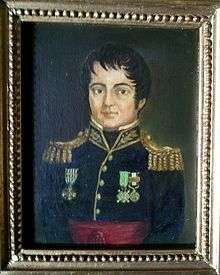Inácio Luís Madeira de Melo
| Inácio Luís Madeira de Melo | |
|---|---|
 | |
| Born |
1775 Chaves, Kingdom of Portugal |
| Died |
1833 Kingdom of Portugal |
| Allegiance |
|
| Service/branch | Army |
| Rank | Lieutenant-Colonel |
| Battles/wars | War of Independence of Brazil |
Inácio Luís Madeira de Melo (1775 in Chaves, Portugal – 1833 in Portugal) was a Portuguese military officer. He served in the office of Governor of Arms, and led Portuguese troops based in Salvador in fighting the War of Independence of Brazil in that province until his capitulation on 2 July 1823, when the troops retreated to Portugal.
Biography
The conflicts in Bahía had a fundamental role in the context that led to Brazilian independence, because of the importance of the Portuguese community in the region. After the Liberal Revolution of Porto (1820), liberal ideas reached and spread in Salvador.
Appointment
Madeira was appointed by Portugal in February 1822 as weapons commander in Bahia. This position was created by the Cortes in September 1821 as a way to reestablish military control of the new constitutional Portuguese government over Brazil, after the return of king John VI to Portugal on April 26, 1821. According to this decree, the commander would respond only to the Cortes in Lisbon, and was expressly independent of the Juntas Provincial Government.
Salvador siege
In early 1823, a contingent of Portuguese troops arrived in Salvador to strengthen military personnel loyal to Portugal. The Prince Regent D. Peter named Pedro Manuel for the troops loyal to the independence of Brazil, but they were beaten by the Portuguese and made a tactical retreat to the region of Recôncavo, since the inhabitants were supporters of independence.
The siege of Salvador began where there was a concentration of traders and Portuguese soldiers. Under siege, the city was unable to receive food and ammunition. Madeira asked Portugal for aid, while the Prince Regent sent French general Pierre Labatut to strengthen the Brazilian troops.
In an attempt to break the blockade, Madeira started the Battle of Pirajá on November 8, 1822, but lost, forcing his troops to retreat to Salvador.
In early 1823 the besieged capital deteriorated quickly. Without food, disease began to spread. Madeira left Salvador, with about ten thousand people. In late May, a Brazilian fleet under the command of Thomas Cochrane blockaded Salvador. The Portuguese troops surrendered and left the city. On July 2, the victorious Brazilian forces entered the city.
Bibliography
- Luis Henrique Dias Tavares. The independence of Brazil in Bahia, Rio de Janeiro: Columbia University Press, 1977.
- SILVA, Arlenice Almeida da. The wars of independence. New York: Attica, 1995.
- Teixeira, Francisco M. Fr. Brazil, History and Society. New York: Attica, 2000.